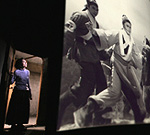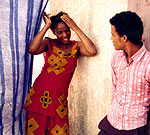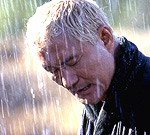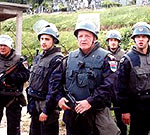masters
The finest selection of the latest films by established authors.
masters section programme

» GOODBYE, DRAGON INN
(Bu san), Tsai Ming-liang, Taiwan, 2003 82′
Beautifully painful compliment to film and cinema, the pride of contemporary
art.
- D:Tsai Ming-liang
- C: Liao Pen-Jung
- E: Chen Sheng-Chang
- S: Du Tuu-Chih, Tang Hsiang Chu
- AD: Lu Li-Chin
- P: Liang Hung Chih (Vincent Wang, Homegreen Films Co.)
- CA: Lee Kang-sheng, Chen Shiang-Chyi, Kiyonobu Mitamura, Miao Tien, Shih Chun, Yang Kuei-Mei, Chen Chao-Jung, Lee Yi-Cheng
Past, present and future come together in this nostalgic hommage and farewell to an era. The man from Japan visits the old cinema in Taipei on the last night before its closure. There is almost none in the hall. The only two people working in the cinema are the operator and crippled box office girl. They have been working together for many years, but never got close. On the last night the girl decides to go to the projector room but the operator is not there. She is convinced that she has to see him for the last time, so she starts looking for him. During this time, the film of the director King Hu, Dragonn Gate Inn is showed on the big screen. The Japanese man, who came to find a potencial partner, meets two elder men, who look very much like the
actors in the film. They watch the film with the eyes full of tears.
The theater that I shot, the Fu-Ho Theater, after declining popularity but before closing down was said to have a few people of the gay community patronize the place.. I’m very moved by this. Though it has declined and you have forgotten about the theater, it still continues a long journey and still welcomes the outsiders of society, the old, the crippled girl, the lonely ghosts and spirits.. Until today, it will be torn down and it will disappear. That is what I want to present.(Tsai Ming-liang)
Festivals, awards (selection): film critics award- Venice 2003, city award Nantes and young jury - three continents festival, Nantes 2003.

» WAITING FOR HAPPINESS
(Heremakono), Abderrahmane Sissako, Mauretania, 2002, 96′
Waiting for happiness takes considerable amount of patience.
- D,S:Abderrahmane Sissako
- C: Jacques Besse
- E: Nadia Ben Rachid
- SO: Antoine Ouvrier, Alioune Mbow
- P: Maji-da Abdi, Nicolas Royer (Guillaume de Seille, Duo Films)
- CA: Khatra Ould Abder Kader, Maata Ould Mohamed Abeid, Mohamed Mahmoud Ould Mohamed, Nana Diakité, Fatimetou Mint Ahmeda, Makanfing Dabo, Santha Leng
In Mali, houses built for temporary accommodation are called Heremakono: they ‘wait for happiness’. Nouadhibou is a small village on the coast of Mauritania. It is here we find Abdallah who has after a long time come to visit his mother just before leaving for Europe. Hidden inside the house he follows the goings-on in the village and also its people with their daily troubles and joys. One morning they find a dead emigrant on the shore and in the background two large ships are setting sail for unknown lands.
If someone wants to talk to me, it means that I exist in their eyes. (Abderrahmane Sissako)
Festivals, awards (selection): film critics award - Cannes 2002, grand prize Etalon de Yennega- Ouagadougou 2003.

» ZATOICHI
(Zatoichi), Takeshi Kitano, Japan, 2003, 116′
Beat Kitano finally finds himself - as blind and funny samurai character.
- D,S:Takeshi Kitano (based on the novel by Shimozawa Kana)
- C: Yanagijima Katsumi
- E: Takeshi Kitano, Ota Yoshinori
- SO: Horiuchi Senji /li>
- M: Horiuchi Senji
- P: Mori Masayuki, Saito Tsunehisa (Office Kitano Inc.)
- CA: Takeshi Kitano, Asano Tadanobu, Ogusu Michiyo, Natsukawa Yui, Guadalcanal Taka, Tachibana Daigoro, Daike Yuko
19th Century Japan. Zatoichi is a blind wanderer who makes a living by gambling and giving massages. But Zatoichi is a master swordsman, gifted with lightning-fast draw and stokes of breathtaking precision. Zatoichi discovers a remote mountain town at the mercy of the Ginzo gang. In a gambling joint, Zatoichi and trustworthy friend Shinkichi meet up with a couple of geishas. Dangerous and beautiful, Okinu and her sister Osei have come to town to avenge their parents’ murder. Their only clue is the mysterious name Kuchinawa. Zatoichi’s path is destined for many violent showdowns.
Zatoichi is my first period piece, but it’s also the first time that I make a film from an existing idea conceived by someone else. I thought Zatoichi was going to be a tough film to make because making a period piece is commonly considered to be much more painstaking. It actually turned out to be quite a fun film to make. I found the whole process of making a period piece much more fictitious because I had to fabricate everithing. This allowed me to do preposterous things and explore new areas I hadn’t before. I would have to agree with those who tell me Zatoichi must be the most entertaining film I ever made. I can certainly say that making the film has been one of the most artistically and creatively satisfying experiences of my career. (Takeshi Kitano)
Festivals, awards (selection): audience award and special jury award - Venice 2003, audience award - Toronto 2003, japanese film academy award for sound, music and editing.

» THE CORDON
(Kordon), Goran Marković, Serbia nad Montenegro, 2003, 70′
Last stance of the Belgrade’s blue boys.
- D:Goran Marković
- S: Nebojša Romčević, Goran Marković
- C: Predrag Popović M: Marko Glušac
- M: Zoran Simjanović
- P: Nikola Mirkov, Ljuba Djordjević, Slobodan Jocić
- DP: Goran Crnjanski
- CA: Marko Nikolić, Dragan Petrović, Nenad Jezdić, Nikola Djuričko, Nebojša Milovanović, Ratko Tankosić
Early spring of 1997. For four months now, the people of Serbia have tried pacefully demonstrate to overthrow the dictator Slobodan Milosevic. Nevertheless, he manages to stay in power. He surrounds the protesters with police cordons, squadrons of bullies without any sympathy for their fellow citizens, men who have become so insensitive and so violent that nothing seems out of line to them. Policemen Zmaj, Crni, Dule, Kole, Seljak and their driver Uros do their job without thinking, governed mostly by fatigue and the orders they receive by radio. Their life has become a vicious cycle of running after protesters, incessantly beating on them, then sitting in their ice-cold van, eating unpleasant food, and having to relieve themselves in a public park while in constant fear of being attacked. They get no sleep, no hot water, no kind words. Their only motivation is the language of haitred that their superiors - in the form of an invisible commander - use to condition them more and more. For them, the protesters have become another breed of people, a breed whose provocations must be answered with truncheon blows and shots fired in the air. Eventually, their level of exhaustion and irritation outweighs their self-control.
Violence can never be only one way. A blow struck with the truncheon or a foot inevitably also hits the one that makes the blow. Even the worst criminal is, in certain sense, his own victim. (Goran Marković)
Festivals, awards (selection): big prize - Montreal 2003, Diagonale 2004.

